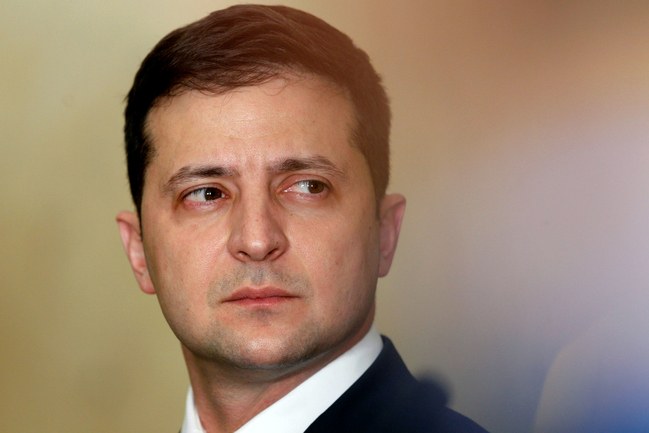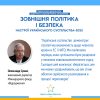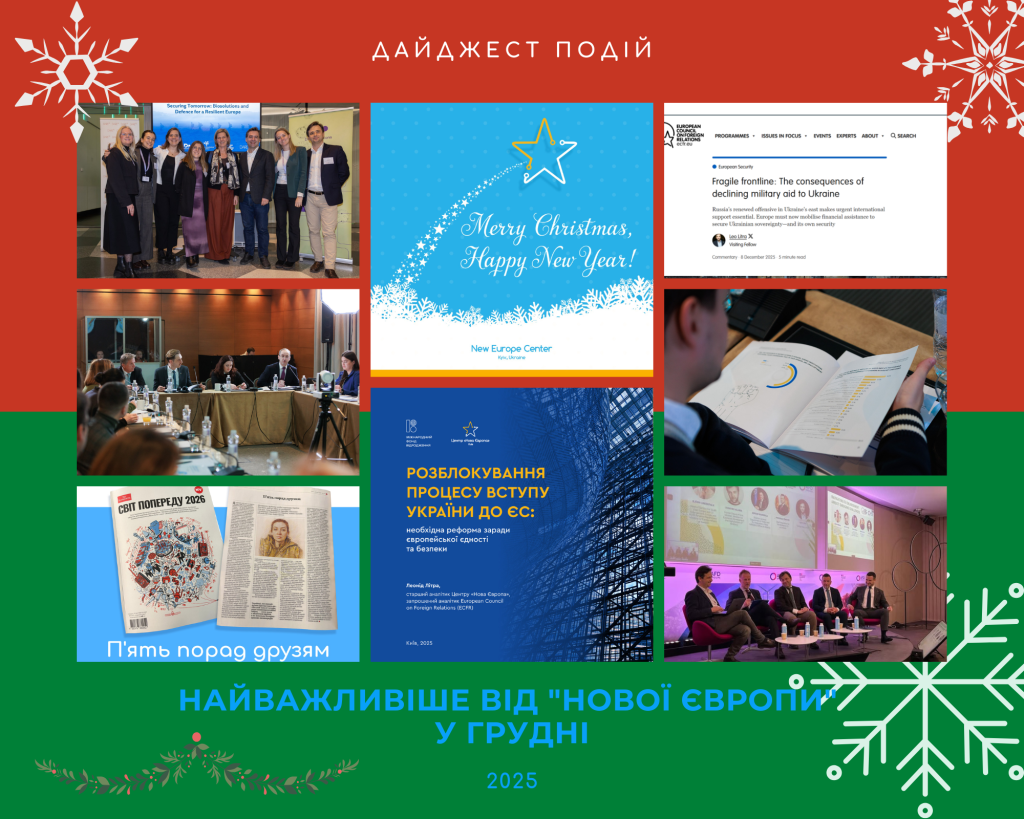Comment by Alyona Getmanchuk for “The New Yorker”.
As Volodymyr Zelensky plans to meet with Vladimir Putin for peace talks about the conflict in the Donbass region, Trump, fighting his own impeachment battle, has shown no interest in helping.
On Monday, in Paris, Volodymyr Zelensky and Vladimir Putin will meet, for the first time, for face-to-face peace talks on a five-year conflict in eastern Ukraine that has cost more than thirteen thousand lives. Ending the war in the Donbass has been the primary policy goal for Zelensky since he took office last May. “I am focussed on the Donbass, on ending this war,” he told me in Kyiv this summer, when I was reporting a profile of him for the magazine. Ukrainian voters had given him a “quota of trust,” as he put it, and it was time to bring the war to a close.Yet unlike on matters of, say, land-sale reform or anti-corruption legislation, that is not something that Zelensky, or any Ukrainian President, can will into being. Zelensky needs the acquiescence, or at least participation, of Putin, who provides the military firepower and diplomatic backing that props up the Donbass’s separatist enclaves. Making things even more complicated for Zelensky, and affecting both his and Putin’s calculations, are the impeachment hearings in Washington, where President Trump is accused of suborning U.S. policy toward Ukraine in the service of his own political bugbears.
From the moment of Zelensky’s inauguration, last May, he and his advisers saw relations with Trump as imperative to the goal of reaching a negotiated settlement to the Donbass war. The hope in Kyiv was that Zelensky and Trump could meet as soon as possible, and that Zelensky could sell to Trump the idea of playing the “grand peacemaker” in Ukraine, Alyona Getmanchuk, the director of New Europe Center, a foreign-policy think-tank, told me. The United States provides hundreds of millions of dollars in military assistance, and its suspension by Trump for alleged political reasons is a central argument for impeachment. But Washington has no formal role in the multiparty “Normandy Format” talks between Russia and Ukraine that began in 2014, stalled in 2016, and will resume in Paris on Monday.
The presence of an American President, however, would serve as the muscle in the room, strengthening Ukraine’s position against its more powerful neighbor, Getmanchuk said. “Zelensky really hoped to get Trump involved, that the United States would take part in this process, and not just as an observer but an ally.” Trump would get the glory; and Ukraine, peace. This summer, I spoke to a Zelensky adviser for my profile, who seconded why the new Ukrainian President was so intent on arranging a visit to the White House: “It would be a signal to Russia, of course.”
But, as the impeachment hearings have shown, Trump has proved distrustful of Ukraine, viewing the country through the repeatedly disproven conspiracy theory that Ukraine, and not Russia, had tried to interfere in the 2016 U.S. election. To the extent that he cared about Ukraine at all, Trump paid more attention to the efforts of his lawyer Rudy Giuliani to dig up politically useful dirt on Joe Biden. (Gordon Sondland, U.S. Ambassador to the E.U., relayed to a colleague of Taylor’s at the embassy in Kyiv that “Trump cares more about the investigations of Biden” than Ukraine itself.) So, the odds of Trump playing “grand peacemaker” were never all that great to begin with, but were reduced to precisely zero by the whistle-blower complaint that sparked impeachment hearings.
The ongoing political fight in Washington risks turning Ukraine into what Zelensky, like previous Ukrainian Presidents, studiously tried to avoid: a partisan issue, subject to the whims, calculations, and hypocrisies that politics often require of its most devoted practitioners. For most of the twenty-five years of Ukraine’s post-Soviet independence, it enjoyed consistent and bipartisan support in Washington—including, and most importantly, after 2014, when Russia annexed Crimea and sparked war in the Donbass. In the age of Trump, that has eroded. On December 2nd, the Fox News host Tucker Carlson encapsulated a creeping drift in pro-Trump circles of the Republican Party, saying on air, “I think we should probably take the side of Russia, if we have to choose between Russia and Ukraine.”
Zelensky, then, is left in a perilous situation: He faces Putin at a time when U.S. backing for Ukraine has suddenly turned wobbly, but he can’t risk alienating Trump or Republicans any further, lest Ukraine be thrown to the wolves entirely. He knows he will be dealing with Trump for at least another year, perhaps another five. Since the Ukraine-related scandal erupted, Zelensky has been restrained and deflecting in his comments, obviously—and understandably—uninterested in making himself any more of a player in the ongoing impeachment battle than he already has become. He has denied being pressured by Trump. “There was no blackmail,” he said in October at an all-day “press marathon” in Kyiv.
Earlier this month, in an interview with Time and three European outlets, Zelensky went the farthest he has gone in expressing his frustration and disappointment with Trump. “We’re at war. If you’re our strategic partner, then you can’t go blocking anything for us,” he said, referring to the three hundred and twenty million dollars in aid that Trump ordered frozen in July. “I think that’s just about fairness. It’s not about a quid pro quo. It just goes without saying.”
The politicized impeachment fight in Washington may be having another unwelcome effect on Ukraine. All the talk in Congress of corrupt prosecutors, corrupt businessmen, and corrupt politicians creates precisely the opposite picture of the country than the one Zelensky hoped to offer the world. “When America says, for instance, that Ukraine is a corrupt country, that is the hardest of signals,” he told Time and the European outlets. “Everyone hears that signal. Investments, banks, stakeholders, companies, American, European, companies that have international capital in Ukraine, it’s a signal to them that says, ‘Be careful, don’t invest.’ Or, ‘Get out of there.’ ” One of Trump’s main lines of defense is that he was right to put a hold on U.S. aid to Ukraine given the country’s history of corruption.
Going into the Paris talks, Putin is pressuring Zelensky as much as he can: he is aware of his eagerness to end the war, that the United States is absent, and that European leaders are pushing Zelensky to make a deal. “Zelenskiy himself gave Putin leverage by making a rigid commitment in his campaign that he would ‘end the war,’ ” Vladimir Frolov, a Russian foreign-affairs analyst, told the Moscow Times this week. “You can stop the war, but only on Moscow’s conditions.”
Ultimately, the trickiest constituency for Zelensky to navigate may be his own. There is, indeed, enormous support in Ukraine for reaching a deal with Russia to end the war—after all, that was one of Zelensky’s main campaign promises, and he won with seventy-three per cent of the vote. But there is also skepticism toward the mechanics of how that might happen, especially among a vocal minority in politics, media, and civil society. Getmanchuk, the think-tank head, described the caution: “It may be that the current status quo is not as detrimental as peace on Russian terms for part of Ukrainianian élites,” she said, paraphrasing the mood among those who see any concessions as akin to capitulation.
Veterans groups and members of nationalist battalions represent an acute pressure point. This fall, thousands of them, joined by ordinary citizens, gathered in Kyiv to protest Zelensky’s declaration that he would follow a set of conditions, first proposed by Germany’s Foreign Minister, for bringing about an armistice in the Donbass.
During the summer, as I was reporting my profile of Zelensky, I travelled to Avdiivka, one of the last towns on the Ukrainian-held side of the Donbass. Donetsk, the would-be capital of the self-proclaimed rebel government, is just ten miles away. The city of twenty thousand or so people endured intense shelling from 2014 to 2017, but has been relatively quiet since—although I heard the not-so-distant thump of artillery as I walked around town. Ukrainian forces and rebel militias still regularly battle, on a limited scale, testing one another’s readiness and fighting over tactical positions. Elsewhere in the Ukrainian-held regions of the Donbass, development and reconstruction efforts have made the war seem distant. Here in Avdiivka, it remains impossible to ignore.
At a base on the outskirts of town run by Right Sector, a nationalist political movement and militia, I spoke with the local commander, a fighter who goes by the nom de guerre “Da Vinci.” Before 2014, he was an art-school student in western Ukraine; he chose to come east and fight in the Donbass war. Da Vinci, now in his mid-twenties, with a couple hundred fighters under his command, said he was wary of Zelensky. “He wants peace at any cost,” he told me. A self-proclaimed Ukrainian nationalist—his grandfather fought in a right-wing guerrilla army against the Soviet state—Da Vinci favors a harsh, uncompromising position toward Russia: “We should not make peace with them or hold any negotiations with them,” he said. “We should destroy them.” For now, he went on, “We have nothing to talk about.”
Zelensky seems unmoved by such calls; in a confrontation in October with another group of right-wing fighters, near the settlement of Zolote, he scolded them for not removing their weapons from the city as ordered, telling them, “You can’t issue me ultimatums,” and “I’m no sucker.” In his interview with Time and the European journalists, he made his position clear: “I will not agree to go to war in the Donbass. I know there are a lot of hotheads, especially those who hold rallies and say, ‘Let’s go fight and win it all back!’ But at what price? What is the cost? It’s another story of lives and land. And I won’t do it.”
In Avdiivka, I walked around the hallways of the local school with Ludmila Silina, its director. She told me of the worst days of fighting, in 2015, when students, their families, and dozens of locals slept for several days in the cellar of the school building. Shells landed on the streets above, some of them smacking into the walls of the school, leaving pockmarked holes in the concrete. We walked down the steps into the makeshift bomb shelter, still standing at the ready; one of the rooms had been turned into a bare-bones infirmary. She told me that she was exhausted by the war and longed for it to end, once and for all. “World War Two lasted five years, this one is going on six,” she said. Silina had supported Zelensky in the election, and expected him to deliver on his promise to end the conflict. “Peace is a long process. We understand it can’t happen overnight,” she said. “But he is President—he should figure it out.”
Joshua Yaffa is a Moscow correspondent for The New Yorker.








